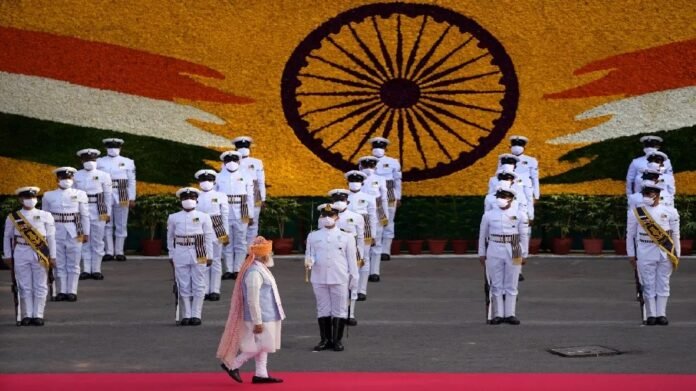India, the third largest buyer of crude oil in the world, after China and the US, is likely to feel the impact of a potential surge in global oil prices following the Trump administration’s sweeping sanctions on Russia’s two largest oil producers—Rosneft and Lukoil. Since 2022, India has emerged as the largest buyer of crude oil from Russia. Between January and September, it imported around 1.7 million barrels per day from Russia, as per Reuters.
The US sanctions have led to a 5% increase in global oil price. For a developing country like India, a rise in global crude price is a major challenge because as an oil guzzler, it will have to shell out more foreign currencies to meet the demands of oil in the country. It may impact the Indian economy, say some experts who seem to be oblivious to the fact that India has an inimitable ability to deal with any challenge that comes its way.
Ability to meet any challenge
Whether it was the sanctions imposed by the US and its allies after the 1998 Pokhran nuclear tests or the Covid-19 pandemic of 2020-21 that disrupted global supply chains or the February 2022 Russia-Ukraine War that triggered crisis on agriculture, fertiliser and oil fronts, India navigated each of these challenges with grit and resilience.
In fact, at a time when geopolitics is shifting at a rapid pace, international rules and regulations are being flouted with impunity by major powers, and traditional alliances and understandings have either collapsed or are on the brink of crumbling, India has chosen to mark its path by turning each challenge into an opportunity.
For example, Japan, South Korea, and the European Union—all key allies of the US, surrendered before Trump to avoid the high tariff that the US President has imposed on them. To bring the 25% tariff down to 15%, Japan has pledged $550 billion, while South Korea has offered $350 billion in investments in the US.
The European Union has pledged to make an investment of $600 billion over the course of time during Trump’s presidency and purchase $750 billion in US energy. The US has, though, imposed a 15% tariff on all imports from the EU, it has slapped a 28% tariff on auto imports from the 27-European countries’ bloc.
In contrast, India has refused to bow to the US dictates even as the Trump administration has imposed a steep high 50% tariff on Indian imports to America. Without showing any sign of hesitation, Union Minister Piyush Goyal made it clear that India will not sign any trade deal with the US in haste. Goyal also let the EU know that India will not agree to its conditions that restrict its trading choices.
Whether it was the sanctions imposed by the US and its allies after the 1998 Pokhran nuclear tests or the Covid-19 pandemic of 2020-21 that disrupted global supply chains or the February 2022 Russia-Ukraine War that triggered crisis on agriculture, fertiliser and oil fronts, India navigated each of these challenges with grit and resilience
Making sovereign decisions under no pressure
Arguably, India’s strategic autonomy calls for making sovereign decisions without being constrained by any external pressure or obligations. But the West, which believes in the dictum of ‘my way or high way’ has yet to realise that India as a civilisational state is endowed with extraordinary capacity to chart its own course—steadfastly and self-assuredly even though the path ahead is harsh and uneven.
This is evidently seen in the case of semiconductor technology. By advancing its indigenous semiconductor capabilities, India has successfully developed a 7-nanometre processor, making its entry into the advanced node semiconductor design ecosystem. This achievement places India among countries like the US, Taiwan and South Korea which are global leaders in cutting-edge semiconductor technology. This is also an answer to the US and other countries which have accelerated the use of protectionist measures, driven by sheer nationalism.
To guard their interests, these countries have come out with steep tariffs, subsidies for domestic industries and stricter trade regulations. In turn, India’s approach has been guided by pragmatism and strategic foresight, focusing on building self-reliance. And it could be seen in the areas like defence, space, medicine, and critical technology where India is charting its course by investing in its own capabilities—a mantra which has now become central to the country’s policy and decision-making framework.
India’s growing stature
This is what has made India stand firm irrespective of geopolitical pressures and twists – a fact which can be seen in its approach in international affairs. It is a member of both the Quad and the BRICS at the same time; it attends the G-7 summit as an observer, while also engaging closely with the Global South. It is today seen as a solution to many complex issues, including the South China Sea.
“India has a lot to offer to ASEAN. As a committed dialogue that stresses ASEAN as core pillar of its engagement, we may turn our gaze to India for solutions to our common concerns—foremost, as a maritime and archipelagic nation, I wish to highlight great importance of rule of law in our oceans,” Philippines President Bongbong Marcos said during India-ASEAN summit in Kuala Lumpur on October 26.
India has refused to bow to the US dictates even as the Trump administration has imposed a steep high 50% tariff on Indian imports to America. Without showing any sign of hesitation, Union Minister Piyush Goyal made it clear that India will not sign any trade deal with the US in haste. Goyal also let the EU know that India will not agree to its conditions that restrict its trading choices
Obviously, this statement reflects India’s growing stature, which received a significant boost after Operation Sindoor. The operation not only shattered Islamabad’s nuclear blackmailing, but also exposed China, whose advanced military technology and extensive satellite surveillance failed to protect Pakistan from the devastating precision strikes India carried out against its terrorists and military infrastructure in May.
Why India shies away from playing a mediatory role
India’s maturity and diplomatic weight have been a factor in enabling Norway to play a formal mediatory role in Sri Lanka’s peace process in 2001-2006 or in the post 2001 -Afghanistan when it favoured Afghan-led initiatives. In both the countries, India’s quiet diplomacy was recognised, yet it rarely positioned itself as mediator in a formal sense.
On the other hand, the US, China, Saudi Arabia or even Turkey and Egypt have lost no opportunity to play a mediatory role whenever opportunity comes their way. It was clearly seen in the case of Egypt which organised a summit in Sharm-el-Sheikh to end the war in Gaza on October 13.
Co-chaired by Egyptian President Abdel Fattah el-Sisi and US President Trump, the summit was attended by 20 international leaders, including UK Prime Minister Keir Starmer and UN Secretary-General Antonio Guterres. Even as the effectiveness of this summit may be questioned, since neither Israel nor Hamas was represented, the summit nonetheless succeeded in reinforcing Egypt’s image as a peacemaker in the region.
Similarly, Turkey last year played an important role in ending the crisis between Somalia and Ethiopia. This year on October 26, Afghanistan and Pakistan held the second round of their talks in Istanbul to end clashes between the two on the contentious Durand Line.
The meeting took place days after Qatar and Turkey brokered a ceasefire in Doha to halt deadly fighting between Afghanistan and Pakistan since 2021 when the Taliban took over Kabul. Ironically, while the two countries were still in talks in Istanbul, their armed forces were engaged in bloody fighting against each other along the Durand Line, which Kabul does not recognise as a border. Nevertheless, Turkey has added weight to its diplomacy by bringing Afghan Taliban and Pakistan on the negotiating table.
Arguably, India’s strategic autonomy calls for making sovereign decisions without being constrained by any external pressure or obligations. But the West, which believes in the dictum of ‘my way or high way’ has yet to realise that India as a civilisational state is endowed with extraordinary capacity to chart its own course—steadfastly and self-assuredly even though the path ahead is harsh and uneven
According to the US Institute of Peace (USIP), mediation is “a mode of negotiation in which a mutually acceptable third party helps the parties to a conflict find a solution that they cannot find by themselves.” In this context, China’s role in ending years of enmity between Saudi Arabia and Iran merits attention. In March, 2023, China successfully brokered normalisation of ties between Riyadh and Tehran, ending their mutual hostilities that engulfed their relations particularly in the wake of conflicts in Yemen and Syria.
To become a successful mediator, a nation must have a reputation for integrity and honesty while strictly maintaining a non-partisan approach. It should understand each side’s core interests and red lines as well as the diplomatic access and economic leverage through trade, investment, and aid, necessary to influence both parties constructively.
India possesses all these attributes, yet shies away from adopting a role of a mediator. This can be seen in the case of the ongoing Russia-Ukraine War. Despite maintaining very good relations with both Russia and Ukraine, India has refrained from actively positioning itself as a peacemaker. Similarly, it could have positioned itself as a mediator between Israel and Palestine, but on account of lack of confidence, it has not been successful in translating its longstanding support for the two-state solution into tangible outcomes.
India’s maturity and diplomatic weight have been a factor in enabling Norway to play a formal mediatory role in Sri Lanka’s peace process in 2001-2006 or in the post 2001 -Afghanistan when it favoured Afghan-led initiatives. In both the countries, India’s quiet diplomacy was recognised, yet it rarely positioned itself as mediator in a formal sense
Meanwhile, it is also true that India, as a nation, has consistently demonstrated resilience in the face of global disruptions. Whether they were economic sanctions, pandemics, or wars, it has proven its capacity to adapt, endure, and emerge stronger. Its growing economic weight, technological strides, and principled pursuit of strategic autonomy have elevated its stature in the international system.
Yet, while India has mastered the art of navigating global turbulence with composure and conviction, it has not yet leveraged its moral authority and credibility to play a more proactive mediatory role in world affairs. By embracing the role of a constructive peacemaker, New Delhi can not only reinforce its image as a responsible global power but also contribute meaningfully to building a more stable, multipolar world order – where dialogue, not dominance, defines diplomacy.
–The writer is a senior journalist with wide experience in covering international affairs. The views expressed are of the writer and do not necessarily reflect the views of Raksha Anirveda






